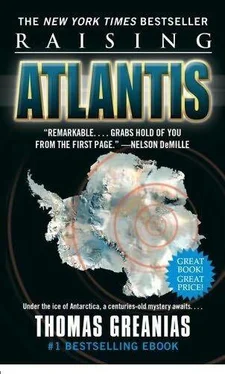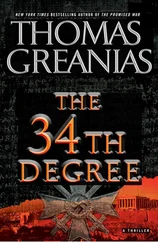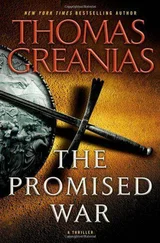Conrad said, “Come on, Lundstrom, riding the space shuttle couldn’t have been this bumpy.”
Lundstrom said nothing and returned his attention to the steering column.
Conrad scanned the weather radar and saw four swirling storms converging into a double-low.
“We’re flying into that?”
“We’re going to slip between the back side of one low and the front side of the other before they merge,” Lundstrom said. “McMurdo advises us that back side winds of the first low won’t exceed a hundred knots. Then we ride the front side of the other low, tailwinds of about a hundred and twenty knots pushing us downhill all the way to the ice.”
“In one piece?” McMurdo, Conrad knew, was the largest American station on the continent. “I thought McMurdo had a big airstrip. Why can’t we land there and try again here tomorrow? What’s the rush?”
“Our window is closing fast.” Lundstrom tapped the radar screen. “Tomorrow those two lows will have merged into one big nasty mother. Now get back to your seat.”
Conrad took a seat behind the navigator. “I am.”
Lundstrom glanced at his copilot. Conrad could see their reflections in the windshield. Apparently they had decided he might as well stay.
Lundstrom said, “Your file warned us that you were trouble. Like father, like son, I suppose.”
“He’s not my real father, I’m not his real son.” At least at this moment Conrad hoped not. Like most Americans he had suspected the existence of a database with information about him somewhere in Washington. Now Lundstrom had confirmed it. “Or wasn’t that information in my file?”
“That along with some psychiatric evaluations,” Lundstrom said, obviously enjoying this exercise at Conrad’s expense. “Nightmares about the end of the world. No memories before the age of five. You were one screwed-up kid.”
“Guess you missed the joys of being breastfed milk tainted with LSD and other hallucinogens,” Conrad said. “Or having full-blown flashbacks when you were six. Or kicking the asses of little Air Force brats who said you were a screwed-up kid.”
Lundstrom grew quiet for a moment, busying himself with the controls.
But Conrad’s interest was piqued. “What else does my file say?”
“Some shit you pulled the first time we went to war with Iraq in the 1990s.”
Conrad was still in grad school back then. “Ancient history.”
“That’s what I heard,” said Lundstrom. “Something about Soviet MiGs and the Ziggurat at Ur.”
Conrad nodded. Four thousand years ago Ur was the capital of Sumer in the land of Abraham. Today it was buried in the sands of modern-day Iraq. “Something like that.”
“Like what?” Lundstrom seemed genuinely curious. Apparently Conrad’s file didn’t include everything.
“The Iraqis had a nasty habit of building military installations next to archaeological treasures as shields for protection,” Conrad said. “So when U.S. satellites detected two Soviet MiG-21 attack jets next to the ruins of the ancient Ziggurat at Ur, the Pentagon concluded the Iraqis were parking the MiGs there to avoid bombing.”
Lundstrom nodded. “I remember hearing that.”
“Well, they also suspected Hussein himself was holed up inside the ziggurat,” Conrad went on. “So I gave them the targeting information they needed to launch a Maverick missile at the site.”
“A Maverick? That was first-generation bunker buster. You’re shitting me.”
“Only a Maverick could burrow its way beneath the pyramid and destroy it from the inside out and make the explosion look like an Iraqi mishap.”
“So you’d wipe an eternal treasure from the face of the earth just to kill some despot du jour?” Lundstrom actually seemed shocked. “What the hell kind of archaeologist are you?”
“The kind you nice people apparently need,” Conrad said. “So now why don’t you tell me-”
Suddenly a throbbing whine alerted the crew. Lundstrom gripped the controls. The copilot checked his instruments.
The navigator shouted, “Side winds at two-fifty G have shifted around to eighty G!”
“Wind sheer,” said Lundstrom, adjusting the yoke. “Damn, she’s stiff. Looks like we found the jet stream.”
Conrad braced himself against his seat as the plane hit heavy turbulence and the gyros began to wander and go wild.
“Gyro’s tumbling,” called the navigator.
Lundstrom shouted, “Give me a celestial fix.”
The navigator swung to the overhead bubble sextant that protruded out the topside skin of the plane and tried to read their location from the stars. But he shook his head. “Soup’s too thick to extrapolate a reading.”
“Ever heard of GPS?” Conrad shouted over the din.
“Useless with the EMP.”
Electromagnetic pulse? thought Conrad. Those kind of microwaves, generated by small explosions of the nuclear variety, had a tendency to knock out all sophisticated technological gear. That explained why they were flying in such an old crate. What the hell was Yeats doing down there on the ice?
Conrad said, “What about a goddamn Doppler navigation system?”
“Negative.”
“Listen to me, Lundstrom. We have to radio the tower at McMurdo for help. How far away are we?”
“You don’t get it, Conrad,” said Lundstrom. “We’re not landing at McMurdo. Our designated landing site is elsewhere.”
“Wherever ‘elsewhere’ is, we’re not going to make it, Lundstrom,” he said. “You’ve got to change course for McMurdo.”
“Too late,” said Lundstrom. “We passed our point of safe return. We’re committed.”
“Or should be,” said Conrad, “along with Yeats and your whole sorry bunch in Washington.”
The navigator shouted, “Headwinds skyrocketing-a hundred knots! Ground speed dropping fast-a hundred fifty knots!”
The plane’s four engines strained to push against the headwinds. Conrad could feel the resistance in the vibrations in the floor beneath his boots. The turbulence rose through his legs like coils of unbridled energy until his insides seemed to melt. For a dead man he felt very much alive and wanted to stay that way.
“Keep this up and we’ll be flying backward,” he grumbled.
“Headwinds a hundred seventy-five knots,” the navigator shouted. “Two hundred! Two twenty-five!”
Lundstrom paused a moment and apparently considered a new strategy. “Cut and feather numbers one and four.”
“Copy,” said the engineer, shutting down two engines.
“Ground speed still dropping,” said the navigator, sounding desperate. “Fuel’s almost spent.”
Conrad said, “What about an emergency landing on the ice pack?”
“Possible,” said Lundstrom. “But this is a wheeled bird. Not a ski bird.”
“Belly land her!” Conrad shouted.
“Negative,” said Lundstrom. “In that stew downstairs we’d probably cream into the side of a berg.”
Another side wind blast hit them so hard that Conrad thought the plane would tip over on its back and spiral down to the ice. Somehow Lundstrom managed to keep her level.
“You’ve got to do something,” Conrad shouted. “Jettison the cargo!”
“General Yeats would sooner jettison us.”
“Then we have to radio for help.”
“Negative. We have radio blackout. Radio’s useless.”
Conrad didn’t believe him. “Bullshit. This is a black ops mission. There’s no goddamn radio blackout. Yeats just wants to keep this quiet.” Conrad slipped behind the radio and tried to put on a headset. But the shaking made it difficult.
“What do you think you’re doing?” Lundstrom demanded.
Conrad slipped the headset on. “Calling for help.”
Conrad heard a click near his ear. But it wasn’t the headset. It was the sliding of a sidearm receiver. He turned to see Lundstrom pointing a shiny Glock 9 mm automatic pistol at his head. Conrad recognized it as his own, which he was relieved of upon boarding the chopper back in Peru. “Get your ass back in your seat, Doctor Conrad.”
Читать дальше












